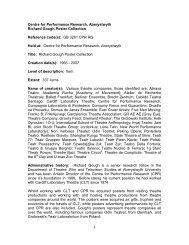MSc Equine Science - Aberystwyth University
MSc Equine Science - Aberystwyth University
MSc Equine Science - Aberystwyth University
Create successful ePaper yourself
Turn your PDF publications into a flip-book with our unique Google optimized e-Paper software.
8<br />
<strong>MSc</strong> EquinE SciEncE<br />
Post Graduate Diploma <strong>Equine</strong> <strong>Science</strong><br />
On successful completion of the taught part of the <strong>MSc</strong>, students<br />
are eligible to be awarded a Post Graduate Diploma in <strong>Equine</strong><br />
<strong>Science</strong>. Most students choose to go on and complete their<br />
dissertation, but if for any reason they do not wish to do so,<br />
they can leave with a Post Graduate Diploma. The Post Graduate<br />
Diploma may also be studied in its own right.<br />
Post Graduate Certificates<br />
We offer 2 Post Graduate Certificates on a part-time basis, which<br />
are based upon the <strong>MSc</strong> modules detailed previously. These Post<br />
Graduate Certificates each consist of 60 credits, with attendance<br />
at <strong>University</strong> for 1 day per week (24 weeks). Their main aim is<br />
to provide greater flexibility for your study, especially if you<br />
are continuing to pursue your career while studying. They also<br />
enable you to accumulate, over time, certificates and modules<br />
towards the award of Post Graduate Diploma and ultimately <strong>MSc</strong><br />
<strong>Equine</strong> <strong>Science</strong>.<br />
Post Graduate Certificate <strong>Equine</strong> Nutrition<br />
This Certificate includes the following modules:<br />
• Principles of Nutrition<br />
• <strong>Equine</strong> nutrition<br />
• <strong>Equine</strong> Anatomy<br />
• Emerging Veterinary <strong>Science</strong><br />
• Literature Review – a 10,000 word literature based<br />
dissertation on a specific area of <strong>Equine</strong> Nutrition<br />
Post Graduate Certificate <strong>Equine</strong><br />
Reproduction And Stud Management<br />
This Certificate includes the following modules:<br />
• <strong>Equine</strong> Reproductive Physiology and Technology<br />
• <strong>Equine</strong> Anatomy<br />
• Emerging Veterinary <strong>Science</strong><br />
• Literature Review – a 10,000 word literature based<br />
dissertation on a specific area of <strong>Equine</strong> reproduction and<br />
Stud Management<br />
Julia<br />
<strong>MSc</strong> <strong>Equine</strong> <strong>Science</strong><br />
Research Assistant <strong>Equine</strong> Fertility Unit. PhD, Post doc, Senior<br />
research scientist Animal Health Trust. Current position:<br />
Lecturer in Applied Immunology & Senior Tutor, School of<br />
Veterinary Medicine & <strong>Science</strong>, <strong>University</strong> of Nottingham<br />
My role is split theoretically equally between<br />
teaching and research. The teaching duties<br />
cover a broad spectrum, ranging from<br />
presentation of lectures, facilitation of small group learning<br />
and assisting in practicals to escorting students on day<br />
placements. Research involves supervision of graduate and<br />
undergraduate student projects as well as submitting grant<br />
applications to the Research Councils and other funding<br />
bodies. As one of two Senior Tutors within the School,<br />
I oversee the Personal Tutorial system, provide pastoral<br />
support to all students as required and liaise with central<br />
university student support services.<br />
From memory, I was the second intake of the <strong>MSc</strong> in<br />
<strong>Equine</strong> <strong>Science</strong> at <strong>Aberystwyth</strong>. It fed my interest in horses<br />
and ultimate goal of undertaking equine research for the<br />
benefit of the horse, leading to Student Project and then a<br />
Research Assistant placement at the <strong>Equine</strong> Fertility Unit in<br />
Cambridge with Prof Twink Allen. Luck was on my side and<br />
this employment led to a PhD and post doctoral research<br />
positions in research institutes and ultimately my current<br />
post in academia.<br />
The course has probably changed in the >20 years since<br />
I was a student. However, I now teach some sessions on<br />
the course and my two main impressions are that: i) the<br />
selection of scientifically qualified students is stringent and<br />
ii) the curriculum remains science based, with an excellent,<br />
research driven core<br />
content, which is<br />
essential for a Masters<br />
level degree.



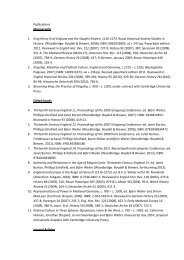
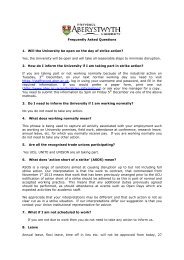

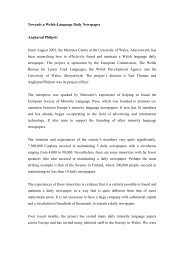
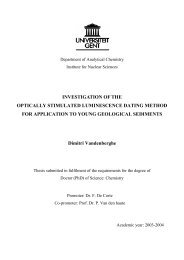
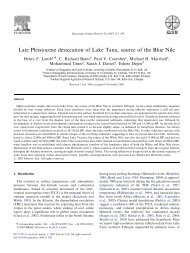
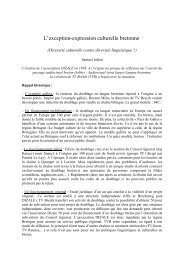
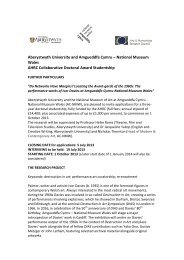
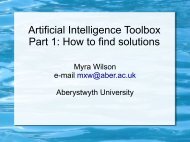

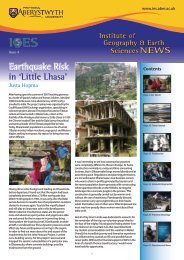
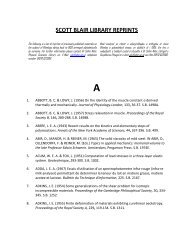
![[pdf] the council - Aberystwyth University](https://img.yumpu.com/8200062/1/184x260/pdf-the-council-aberystwyth-university.jpg?quality=85)
